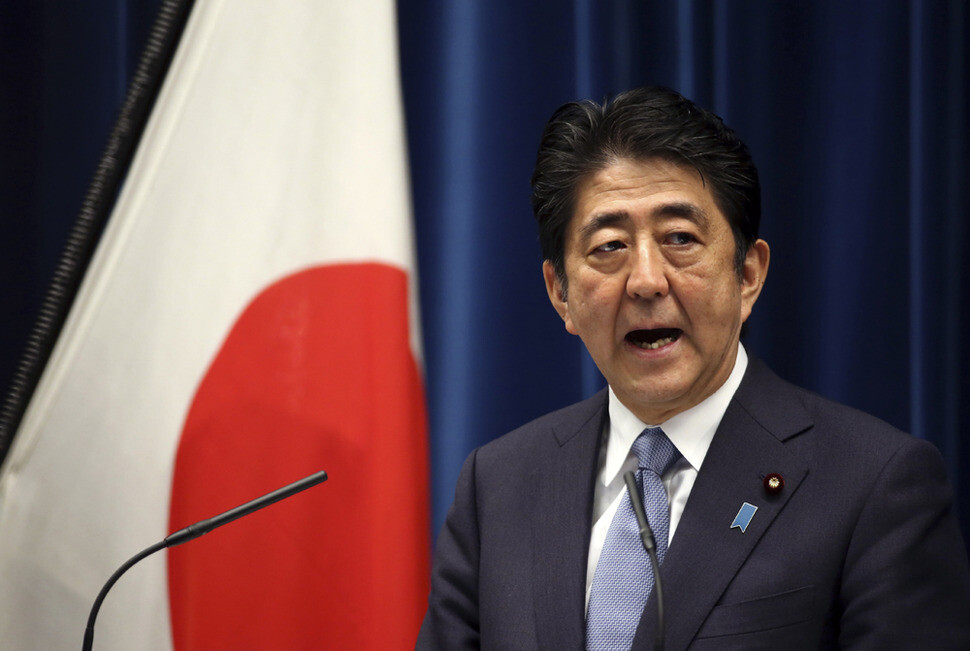hankyoreh
Links to other country sites 다른 나라 사이트 링크
Remarks by Abe in policy speech signal strains in South Korea-Japan relationship

In this year’s policy speech, Japanese Prime Minister Shinzo Abe described South Korea as Japan’s “most important neighbor that shares our strategic interests.” Just like last year, though, he omitted “fundamental values” from this sentence.
“At the end of last year, Japan and South Korea brought to an end a long-standing issue with our final and irreversible settlement on the issue of the comfort women,” Abe said during the speech, which he delivered to a joint session of the Diet, Japan’s parliament, on Jan. 22. “Since South Korea is our most important neighbor that shares our strategic interests, we will build a cooperative relationship for a new era in order to ensure peace and stability in East Asia.”
During policy speeches in 2013 and 2014, Abe had referred to South Korea as Japan’s “most important neighbor that shares our fundamental values and interests,” but last year he omitted the phrase “fundamental values.” After this, a description of South Korea as a “neighbor sharing the fundamental values of democracy and human rights” was omitted from the website of Japan’s Ministry of Foreign Affairs and from Japan’s Diplomatic Bluebook.
In contrast, a statement by Japan’s Minister for Foreign Affairs congratulating Tsai Ing-wen’s election as president of Taiwan on Jan. 16 referred to Taiwan as “an important partner that shares our fundamental values.”
Abe’s decision to describe South Korea as a country that only shares “strategic interests” and not “fundamental values” appears to reflect unpleasant feelings that still remain even after the Dec. 28 settlement of the comfort women issue. In other words, Abe views South Korea not as a friend that shares values but as just a business partner that he must work with in regard to the issues of China’s rise and North Korea’s nuclear weapons and missile programs.
“China’s peaceful rise,” Abe said, “is a great opportunity not only for Japan but also for the world. We will keep working to improve relations under the principle of a reciprocal strategic relationship.”
Abe’s message was followed by a foreign policy address by Japanese Minister for Foreign Affairs Fumio Kishida, whose speech included a reference to Dokdo, a South Korean island claimed by Japan. “Takeshima [the Japanese name for Dokdo] in Shimane Prefecture is the sovereign territory of Japan, and we will continue to clearly communicate Japan’s claims and persist in our response,” Kishida said.
By Gil Yun-hyung, Tokyo correspondent
Please direct questions or comments to [english@hani.co.kr]

Editorial・opinion
![[Column] Samsung’s ‘lost decade’ and Lee Jae-yong’s mismatched chopsticks [Column] Samsung’s ‘lost decade’ and Lee Jae-yong’s mismatched chopsticks](https://flexible.img.hani.co.kr/flexible/normal/500/300/imgdb/original/2024/0512/3017154788490114.jpg) [Column] Samsung’s ‘lost decade’ and Lee Jae-yong’s mismatched chopsticks
[Column] Samsung’s ‘lost decade’ and Lee Jae-yong’s mismatched chopsticks![[Correspondent’s column] The real reason the US is worried about Chinese ‘overcapacity’ [Correspondent’s column] The real reason the US is worried about Chinese ‘overcapacity’](https://flexible.img.hani.co.kr/flexible/normal/500/300/imgdb/original/2024/0510/5217153290112576.jpg) [Correspondent’s column] The real reason the US is worried about Chinese ‘overcapacity’
[Correspondent’s column] The real reason the US is worried about Chinese ‘overcapacity’- [Editorial] Yoon’s gesture at communication only highlights his reluctance to change
- [Editorial] Perilous stakes of Trump’s rhetoric around US troop pullout from Korea
- [Guest essay] Preventing Korean Peninsula from becoming front line of new cold war
- [Column] The state is back — but is it in business?
- [Column] Life on our Trisolaris
- [Editorial] Penalties for airing allegations against Korea’s first lady endanger free press
- [Editorial] Yoon must halt procurement of SM-3 interceptor missiles
- [Guest essay] Maybe Korea’s rapid population decline is an opportunity, not a crisis
Most viewed articles
- 1[Column] Samsung’s ‘lost decade’ and Lee Jae-yong’s mismatched chopsticks
- 2Seoul’s plan to adopt SM-3 missiles is like wanting a sledgehammer to catch a fly
- 3S.K.-Japan joint history project to be revived
- 4Yoon rejects calls for special counsel probes into Marine’s death, first lady in long-awaited presse
- 5With Naver’s inside director at Line gone, buyout negotiations appear to be well underway
- 6Korea poised to overtake Taiwan as world’s No. 2 chip producer by 2032
- 7[Correspondent’s column] The real reason the US is worried about Chinese ‘overcapacity’
- 8S. Korean arrested and detained in Russia under espionage charges for first time in history, Moscow
- 9[Korea travels] Korea’s best stargazing spots put the Milky Way almost in reach
- 10[Guest essay] Maybe Korea’s rapid population decline is an opportunity, not a crisis